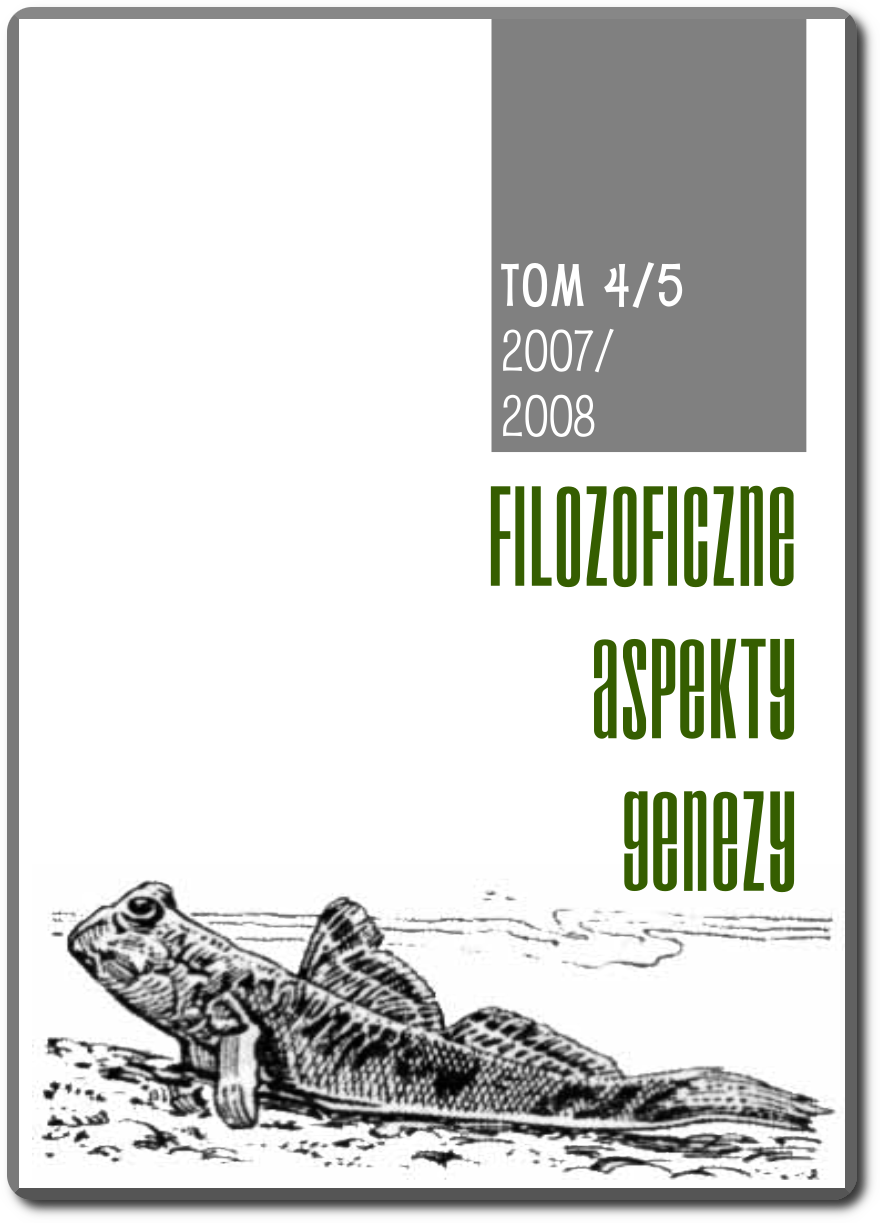Opublikowane 21.05.2021
Słowa kluczowe
- inteligentny projekt,
- tradycyjny kreacjonizm,
- darwinizm,
- dobór naturalny,
- losowość
- informacja,
- nauka ...More

Utwór dostępny jest na licencji Creative Commons Uznanie autorstwa 4.0 Międzynarodowe.
Jak cytować
Abstrakt
Taner Edis argumentuje, że choć teoria inteligentnego projektu w dużej mierze po prostu powtarza błędy dawno zdyskredytowanego tradycyjnego kreacjonizmu, część jej twierdzeń może mieć znaczenie dla rozwoju nauki. Edisowi chodzi o twierdzenia, dotyczące natury inteligencji i wykrywania projektu. Mimo iż jego zdaniem nie są one słuszne, zdanie sobie sprawy, dlaczego tak jest, może pomóc naukowcom w dostrzeżeniu, w jak wielkim stopniu współczesna nauka ma charakter interdyscyplinarny, a to mogłoby przyśpieszyć rozwiązanie jednego z najbardziej fundamentalnych problemów naukowych, jakim jest kwestia pochodzenia informacji.
Downloads
Bibliografia
- Behe Michael J., Czarna skrzynka Darwina. Biochemiczne wyzwanie dla ewolucjonizmu, przeł. Dariusz Sagan, Biblioteka Filozoficznych Aspektów Genezy, t. 4, Wydawnictwo MEGAS, Warszawa 2008.
- Hunter Cornelius G., Darwin’s Proof: The Triumph of Religion over Science, Brazos Press, Grand Rapids, MI. 2003.
- Musgrave Ian F., „Evolution of the Bacterial Flagellum”, w: Matt YOUNG and Taner EDIS (eds.), Why Intelligent Design Fails: A Scientific Critique of the New Creationism, Rutgers University Press, New Brunswick, NJ. 2004.
- Gonzalez Guillermo and Jay Richards W., The Privileged Planet: How Our Place in the Cosmos is Designed for Discovery, Regnery Publishing, Washington, DC. 2004.
- Jefferys William, „Review of The Privileged Planet”, Reports of the National Center for Science Education 2005, vol. 25, no. 1-2, s. 47-49, http://ncseweb.org/rncse/25/1-2/review-privileged-planet (04.03.2009).
- Hurd Gary S., „The Explanatory Filter, Archaeology, and Forensics”, w: Matt YOUNG and Taner EDIS (eds.), Why Intelligent Design Fails: A Scientific Critique of the New Creationism, Rutgers University Press, New Brunswick, NJ. 2004.
- Monod Jacques, Chance and Necessity: An Essay on the Natural Philosophy of Modern Biology, Vintage Books, New York 1972.
- Melnyk Andrew, A Physicalist Manifesto: Thoroughly Modern Materialism, Cambridge University Press, Cambridge, U.K. 2003.
- Johnson Phillip E., The Wedge of Truth: Splitting the Foundations of Naturalism, InterVarsity Press, Downers Grove, IL. 2000.
- Dembski William A., „Signs of Intelligence”, w: William A. DEMBSKI and James M. KUSHINER (eds.), Signs of Intelligence: Understanding Intelligent Design, Brazos Press, Grand Rapids, MI. 2001.
- Dembski William A., Intelligent Design: The Bridge Between Science and Theology, InterVarsity Press, Downers Grove, IL. 1999.
- Dembski William A., The Design Revolution, InterVarsity Press, Downers Grove, IL. 2004.
- Barham James, „The Emergence of Biological Value”, w: William A. DEMBSKI and Michael RUSE (eds.), Debating Design: From Darwin to DNA, Cambridge University Press, Cambridge, U.K. 2004.
- Dembski William A., The Design Inference: Eliminating Chance through Small Probabilities, Cambridge University Press, New York 1998.
- Fitelson Branden, Stephens Christopher and SOBER Elliott, „How Not to Detect Design – Critical Notice: William A. Dembski, The Design Inference”, Philosophy of Science 1999, vol. 66 (3), s. 472-488.
- Fitelson Branden, Stephens Christopher and Sober Elliott, „Jak nie należy wykrywać projektu”, przeł. Adam Trybus, Filozoficzne Aspekty Genezy 2007/2008, t. 4/5, s. 53-80, http://www.nauka-a-religia.uz.zgora.pl/index.php?action=tekst&id=161.
- Shallit Jeffrey and Elsberry Wesley, „Playing Games With Probability: Dembski’s Complex Specified Information”, w: Matt Young and Taner Edis (eds.), Why Intelligent Design Fails: A Scientific Critique of the New Creationism, Rutgers University Press, New Brunswick, NJ. 2004.
- Perakh Mark, Unintelligent Design, Prometheus Books, Amherst, NY. 2004.
- Dembski William A., No Free Lunch: Why Specified Complexity Cannot be Purchased without Intelligence, Lanham, Rowman & Littlefield, MD. 2002.
- Perakh Mark, „There is a Free Lunch After All: William Dembski’s Wrong Answers to Irrelevant Questions”, w: Matt Young and Taner Edis (eds.), Why Intelligent Design Fails: A Scientific Critique of the New Creationism, Rutgers University Press, New Brunswick, NJ. 2004.
- Sober Elliott, „The Design Argument”, w: William A. Dembski and Michael Ruse (eds.), Debating Design: From Darwin to DNA, Cambridge University Press, Cambridge, U.K. 2004.
- Edis Taner, „Chance and Necessity – And Intelligent Design?”, w: Matt Young and Taner Edis (eds.), Why Intelligent Design Fails: A Scientific Critique of the New Creationism, Rutgers University Press, New Brunswick, NJ. 2004.
- Edis Taner, „How Gödel’s Theorem Supports the Possibility of Machine Intelligence”, Minds and Machines 1998, vol. 8, s. 251-262.
- Sims Karl, „Evolving 3D Morphology and Behavior by Competition”, w: Rodney Brooks and Pattie Maes (eds.), Artificial Life IV: Proceedings of the Fourth International Workshop on the Synthesis and Simulation of Living Systems, MIT Press, Cambridge 1994.
- Forrest Barbara and Gross Paul R., Creationism’s Trojan Horse: The Wedge of Intelligent Design, Oxford University Press, New York 2004.



